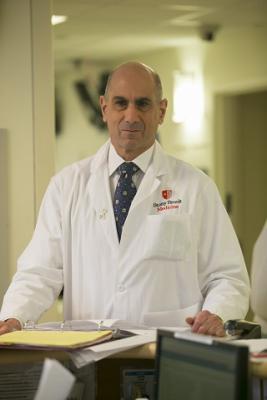December 11, 2013 — For patients with stable coronary artery disease (CAD) who are not experiencing a heart attack and an abnormal stress test, treatment of their narrowed arteries by the common procedure of angioplasty may not provide additional benefits compared to drug therapy alone. This finding results from a survey of more than 4,000 patients with myocardial ischemia led by cardiologists at Stony Brook University School of Medicine. The survey results are published in the online first edition of JAMA Internal Medicine.
In the research paper titled “Percutaneous Coronary Intervention Outcomes in Patients With Stable Obstructive Coronary Artery Disease and Myocardial Ischemia: A Collaborative Meta-analysis of Contemporary Randomized Clinical Trials,” David Brown, M.D., and Kathleen Stergiopoulos, M.D., Ph.D., professors in the Department of Medicine, Division of Cardiovascular Medicine, Stony Brook University School of Medicine, worked with colleagues internationally to design a data
study that combined data from clinical trials performed between 1970 and 2012 of patients who had either percutaneous coronary intervention (PCI), or angioplasty, plus drug therapy, or drug therapy alone to treat their CAD.
Each of the clinical studies within the analysis reported outcomes of death and nonfatal myocardial infarction reported. Additionally, to reflect contemporary medical and interventional practice, inclusion criteria required stent implantation in at least 50 percent of the PCI procedures and statin medications to lower cholesterol in at least 50 percent of patients in both the PCI and drug therapy alone groups. This led to a total of five clinical trials yielding 4,064 patients with myocardial ischemia diagnosed by exercise stress testing, nuclear or echocardiocraphic stress imaging or fractional flow reserve (FFR).
The researchers reviewed outcomes data up to five years post PCI or drug treatment alone. They analyzed all-cause death, non-fatal myocardial infarction, unplanned revascularization, and angina in the patients.
The analysis showed all-cause death rates between the two groups was not significantly different — 6.5 percent for patients receiving PCI and drug therapy versus 7.3 percent for patients receiving drug therapy alone. There was little difference in the rates of nonfatal myocardial infarction (9.2 percent with PCI versus 7.6 percent drug therapy) and recurrent or persistent angina (20.3 percent versus 23.3). The rate of unplanned revascularization was slightly different but not statistically significant (18.3 percent versus 28.4 percent).
“If our findings are confirmed in ongoing trials, many of the more than 10 million stress tests performed annually and subsequent revascularizations may be unnecessary,” said Brown.
He cautioned that additional studies beyond data analyses of clinical trials are necessary to fully determine if practices with PCI in stable CAD patients needs to be re-evaluated, and if so, under what circumstances and in which patient populations.
For more information: www.jamanetwork.com


